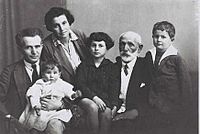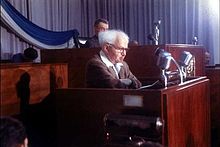- David Ben-Gurion
-
"Ben Gurion" redirects here. For other uses, see Ben Gurion (disambiguation).
David Ben-Gurion
דָּוִד בֶּן-גּוּרִיּוֹן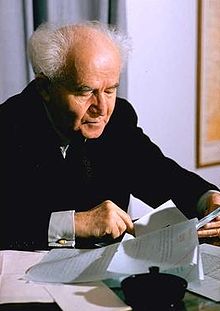
1st Prime Minister of Israel In office
2 November 1955 – 21 June 1963President Yitzhak Ben-Zvi
Zalman ShazarPreceded by Moshe Sharett Succeeded by Levi Eshkol In office
17 May 1948 – 7 December 1954President Chaim Weizmann
Yitzhak Ben-ZviPreceded by Position established Succeeded by Moshe Sharett 1st Chairman of the Provisional State Council of Israel In office
14 May 1948 – 16 May 1948Preceded by Position established Succeeded by Chaim Weizmann Personal details Born 16 October 1886
Płońsk, Russian EmpireDied 1 December 1973 (aged 87)
IsraelPolitical party Mapai, Rafi, National List Spouse(s) Paula Ben-Gurion Children 3 Religion Judaism Signature 
 David Ben-Gurion (help·info) (Hebrew: דָּוִד בֶּן-גּוּרִיּוֹן, born David Grüen; 16 October 1886 – 1 December 1973) was the first Prime Minister of Israel.
David Ben-Gurion (help·info) (Hebrew: דָּוִד בֶּן-גּוּרִיּוֹן, born David Grüen; 16 October 1886 – 1 December 1973) was the first Prime Minister of Israel.Ben-Gurion's passion for Zionism, which began early in life, led him to become a major Zionist leader and Executive Head of the World Zionist Organization in 1946.[1] As head of the Jewish Agency for Palestine, and later president of the Jewish Agency Executive, he became the de facto leader of the Jewish community in Palestine, and largely led the struggle for an independent Jewish state in Palestine. On 14 May 1948, he formally proclaimed the establishment of the State of Israel, and was the first to sign the Israeli Declaration of Independence. Ben-Gurion led the provisional government of Israel during the 1948 Arab-Israeli War, and united the various Jewish militias into the Israel Defense Forces (IDF).
Following the war, Ben-Gurion served as Israel's first Prime Minister. As Prime Minister, he helped build the state institutions, presiding over various national projects aimed at the development of the country. He also oversaw the absorption of vast numbers of Jews from all over the world. A centerpiece of his foreign policy was improving relationships with the West Germans. He worked very well with Konrad Adenauer's government in Bonn and West Germany provided large sums in compensation for Germany's mistreatment of Jews in the Reparations Agreement between Israel and West Germany.[2]
In 1954, he resigned and served as Defense Minister, before returning to office in 1955. Under his leadership, Israel responded aggressively to Arab guerilla attacks, and in 1956, invaded Egypt along with British and French forces after Egypt nationalized the Suez Canal.
He stepped down from office in 1963, and retired from political life in 1970. He then moved to Sde Boker, a kibbutz in the Negev desert, where he lived until his death. Posthumously, Ben-Gurion was named one of Time magazine's 100 Most Important People of the 20th Century.
Contents
Early life
David Ben-Gurion was born in Płońsk, Congress Poland which was then part of the Russian Empire. His father, Avigdor Grüen, was a lawyer and a leader in the Hovevei Zion movement. His mother, Scheindel, died when he was 11 years old. Aged 14 he and two friends formed a youth club, Ezra, promoting Hebrew studies and emigration to the holy land.
In 1905, as a student at the University of Warsaw, he joined the Social-Democratic Jewish Workers' Party - Poalei Zion. He was arrested twice during the Russian Revolution of 1905. In 1906 emigrated to Ottoman Palestine. A month after his arrival he was elected to the central committee of the newly formed branch of Poali Zion in Jaffa, becoming chairman of the party's platform committee. He advocated a more nationalist program than other more leftist/Marxist members of the committee. The following year he complained about the Russian domination of the group. At the time the Jewish population in Palestine was around 55,000 - of whom 40,000 held Russian citizenship.
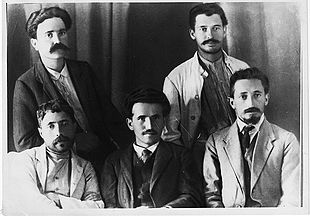 Left to right; seated – Yitzhak Ben-Zvi, David Ben Gurion, Yosef Haim Brenner; standing – A. Reuveni, Jacob Zerubavel (1912)
Left to right; seated – Yitzhak Ben-Zvi, David Ben Gurion, Yosef Haim Brenner; standing – A. Reuveni, Jacob Zerubavel (1912)
In 1907, having been working picking oranges at Petah Tikvah, Ben Gurion moved to the settlements in Galilee were he worked as an agricultural labourer and withdrew from politics. In 1908 he joined an armed group acting as watchmen at Sejera.
On 12 April 1909, following an attempted robbery in which an Arab from Kfar Kanna was killed, Ben Gurion was involved in fighting in which one of the watchmen and a farmer from Sejera were killed.[3]
In 1909 he volunteered with HaShomer, a force of volunteers who helped guard isolated Jewish agricultural communities. On 7 November 1911, Ben Gurion arrived in Thessaloniki in order to learn Turkish for his law studies. The city, which had a large Jewish community, impressed Ben Gurion who called it "a Jewish city that has no equal in the world." He also realized there that "the Jews were capable of all types of work," from rich businessmen and professors, to merchants, craftsmen and porters.[4]
In 1912, he moved to Istanbul, the Ottoman capital, to study law at Istanbul University together with Ben-Zvi, and adopted the Hebrew name Ben-Gurion, after the medieval historian Yosef ben Gurion. He also worked as a journalist. In 1915, Ben-Gurion and Ben-Zvi were expelled from Palestine, still under Ottoman rule, for their political activities.
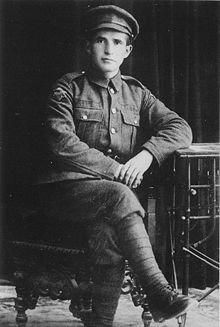 Ben-Gurion in his Jewish Legion uniform in 1918.
Ben-Gurion in his Jewish Legion uniform in 1918.
Settling in New York City in 1915, he met Russian-born Paula Munweis. They were married in 1917, and had three children. He joined the British Army in 1918 as part of the 38th Battalion of the Jewish Legion (following the Balfour Declaration in November 1917). He and his family returned to Palestine after World War I following its capture by the British from the Ottoman Empire.
Zionist leadership
After the death of theorist Ber Borochov, the left-wing and right-wing of Poale Zion split in 1919 with Ben-Gurion and his friend Berl Katznelson leading the right faction of the Labor Zionist movement. The Right Poale Zion formed Ahdut HaAvoda with Ben-Gurion as leader in 1919. In 1920 he assisted in the formation and subsequently became general secretary of the Histadrut, the Zionist Labor Federation in Palestine. At Ahdut HaAvoda's 3rd Congress, held in 1924 at Ein Harod, Shlomo Kaplansky, a veteran leader from Poalei Zion, proposed that the party should support British Mandatory authorites plans for setting up an elected legislative council in Palestine. He argued that a Parliament, even with an Arab majority, was the way forward. Ben Gurion, already emerging as the leader of the Yishuv, succeeded in getting Kaplansky's ideas rejected.[5]
In 1930, Hapoel Hatzair (founded by A. D. Gordon in 1905) and Ahdut HaAvoda joined forces to create Mapai, the more right-wing Zionist labor party (it was still a left-wing organization, but not as far left as other factions) under Ben-Gurion's leadership. In the 1940s the left-wing of Mapai broke away to form Mapam. Labor Zionism became the dominant tendency in the World Zionist Organization and in 1935 Ben-Gurion became chairman of the executive committee of the Jewish Agency for Palestine, a role he kept until the creation of the state of Israel in 1948.
During the 1936–1939 Arab revolt in Palestine, Ben-Gurion instigated a policy of restraint ("Havlagah") in which the Haganah and other Jewish groups did not retaliate for Arab attacks against Jewish civilians, concentrating only on self-defense. In 1937, the Peel Commission recommended partitioning Palestine into Jewish and Arab areas and Ben-Gurion supported this policy.[6] This led to conflict with Ze'ev Jabotinsky who opposed partition and as a result Jabotinsky's supporters split with the Haganah and abandoned Havlagah.
The Ben Gurion House, where he lived from 1931 on, and for part of each year after 1953, is now a museum in Tel Aviv.
Relations with Arabs
Ben-Gurion believed in the equal rights of Arabs who remained in and would become citizens of Israel. He was quoted as saying, "We must start working in Jaffa. Jaffa must employ Arab workers. And there is a question of their wages. I believe that they should receive the same wage as a Jewish worker. An Arab has also the right to be elected president of the state, should he be elected by all."[7][citation needed]
Ben-Gurion recognized the strong attachment of Palestinian Arabs to the land but hoped that this would be overcome in time. In an address to the United Nations and the British Mandate, he also doubted the likelihood of peace with the future Arab nations:
This is our native land; it is not as birds of passage that we return to it. But it is situated in an area engulfed by Arabic-speaking people, mainly followers of Islam. Now, if ever, we must do more than make peace with them; we must achieve collaboration and alliance on equal terms. Remember what Arab delegations from Palestine and its neighbors say in the General Assembly and in other places, talk of Arab-Jewish amity sound fantastic, for the Arabs do not wish it, they will not sit at the same table with us, they want to treat us as they do the Jews of Bagdad, Cairo, and Damascus.[8][citation needed]
Goldmann criticized Ben-Gurion for what he viewed as Ben-Gurion's confrontational approach to the Arab world. Goldmann wrote that "Ben-Gurion is the man principally responsible for the anti-Arab policy, because it was he who moulded the thinking of generations of Israelis."[9]
The view that Ben-Gurion's assessment of Arab feelings led him to emphasize the need to build up Jewish military strength is supported by Simha Flapan, who quoted Ben-Gurion as stating in 1938: "I believe in our power, in our power which will grow, and if it will grow agreement will come..."[10]
British
The British 1939 White paper stipulated that Jewish immigration to Palestine was to be limited to 15,000 a year for the first five years, and would subsequently be contingent on Arab consent. Restrictions were also placed on the rights of Jews to buy land from Arabs. After this Ben-Gurion changed his policy towards the British, stating: "Peace in Palestine is not the best situation for thwarting the policy of the White Paper".[11] Ben-Gurion believed a peaceful solution with the Arabs had no chance and soon began preparing the Yishuv for war. According to Teveth 'through his campaign to mobilize the Yishuv in support of the British war effort, he strove to build the nucleus of a "Hebrew army", and his success in this endeavor later brought victory to Zionism in the struggle to establish a Jewish state.'[12]
During the Second World War, Ben-Gurion encouraged the Jews of Palestine to volunteer for the British army. He famously told Jews to "support the British as if there is no White Paper and oppose the White Paper as if there is no war".[13] About 10% of the Jewish population of Palestine volunteered for the British army, including many women. At the same time Ben-Gurion helped the illegal immigration of thousands of European Jewish refugees to Palestine during a period when the British placed heavy restrictions on Jewish immigration.
In 1946 Ben-Gurion agreed that the Haganah could cooperate with Menachem Begin's Irgun in fighting the British. Ben-Gurion initially agreed to Begin's plan to carry out the 1946 King David Hotel bombing, with the intent of embarrassing (rather than killing) the British military stationed there. However, when the risks of mass killing became apparent, Ben-Gurion told Begin to call the operation off; Begin refused.[14]
Illegal Jewish migration led to pressure on the British to either allow Jewish migration (as required by the League of Nations Mandate) or quit – they did the latter in 1948, not changing their restrictions, on the heels of a United Nations resolution partitioning the territory between the Jews and Arabs.
Comments regarding flight of Arabs
Ben-Gurion had stated to the Mapai Council on 8 February 1948 that "From your entry into Jerusalem, through Lifta, Romema [East Jerusalem]. . . there are no Arabs. One hundred percent Jews. Since Jerusalem was destroyed by the Romans, it has not been Jewish as it is now. In many Arab neighborhoods in the west one sees not a single Arab. I do not assume that this will change. . . . What had happened in Jerusalem. . . . is likely to happen in many parts of the country. . . in the six, eight, or ten months of the campaign there will certainly be great changes in the composition of the population in the country." (Benny Morris, Expulsion of the Palestinians,p. 180–181)
He had also stated in a speech addressing the Zionist Action Committee regarding the 'Arab Demographic Problem' that "We will not be able to win the war if we do not, during the war, populate upper and lower, eastern and western Galilee, the Negev and Jerusalem area, even if only in an artificial way, in a military way. . . . I believe that war will also bring in its wake a great change in the distribution of Arab population." (Benny Morris, p. 181 & Expulsion Of The Palestinians, p. 181)
Religious parties and the status quo
In September 1947 Ben-Gurion reached a status quo agreement with the Orthodox Agudat Yisrael party. He sent a letter to Agudat Yisrael stating that while he is committed to establishing a non-theocratic state with freedom of religion he is promising that Shabbat would be Israel's official day of rest, that in State provided kitchens there will be access to Kosher food, that every effort will be made to provide a single jurisdiction for Jewish family affairs, and that each sector would be granted autonomy in the sphere of education, provided minimum standards regarding the curriculum are observed.[15]
To a large extent this letter (or agreement) provided a framework for religious affairs in Israel (e.g. no civil marriages, just as in Mandate times) and is often a benchmark to which the status[clarification needed] is compared.
Military leadership during the 1948 Arab-Israeli War
During the 1948 Arab-Israeli War Ben-Gurion oversaw the nascent state's military operations. During the first weeks of Israel's independence, he ordered all militias to be replaced by one national army, the Israel Defense Forces (IDF). To that end, Ben-Gurion used a firm hand during the Altalena Affair, a ship carrying arms purchased by the Irgun. He insisted that all weapons be handed over to the IDF. When fighting broke out on the Tel Aviv beach he ordered it be taken by force and to shell the ship. Sixteen Irgun fighters and three IDF soldiers were killed in this battle. Following the policy of a unified military force, he also ordered that the Palmach headquarters be disbanded and its units be integrated with the rest of the IDF, to the chagrin of many of its members. His attempts to reduce the number of Mapam members in the senior ranks led to the "General's Revolt" in June 1948.
As head of the Jewish Agency, Ben-Gurion was de-facto leader of Palestine's Jews even before the state was declared. In this position, Ben-Gurion played a major role in the 1948 Arab-Israeli War and the resulting Palestinian exodus. When the IDF archives and others were opened in the late 1980s, scholars started to reconsider the events and the role of Ben Gurion.[16]
Founding of Israel
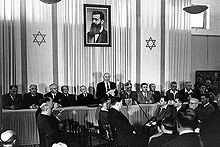 David Ben-Gurion proclaiming independence beneath a large portrait of Theodor Herzl, founder of modern Zionism
David Ben-Gurion proclaiming independence beneath a large portrait of Theodor Herzl, founder of modern Zionism
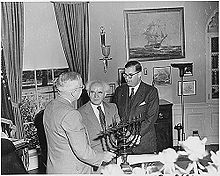 President Truman in the Oval Office, receiving a Hanukkah Menorah as a gift from the Prime Minister of Israel, David Ben-Gurion (center). To the right is Abba Eban, the Ambassador of Israel to the United States.
President Truman in the Oval Office, receiving a Hanukkah Menorah as a gift from the Prime Minister of Israel, David Ben-Gurion (center). To the right is Abba Eban, the Ambassador of Israel to the United States.
On 14 May, on the last day of the British Mandate, Ben-Gurion declared the independence of the state of Israel. In the Israeli declaration of independence, he stated that the new nation would "uphold the full social and political equality of all its citizens, without distinction of religion, race."
In his War Diaries in February of 1948, Ben-Gurion wrote: "The war shall give us the land. The concepts of 'ours' and 'not ours' are peace concepts only, and they lose their meaning during war."[17] Also later he confirmed this by stating that, "In the Negev we shall not buy the land. We shall conquer it. You forget that we are at war."[18]
Prime Minister of Israel
After leading Israel during the 1948 Arab-Israeli War, Ben-Gurion was elected Prime Minister of Israel when his Mapai (Labour) party won the largest number of seats in the first national election, held on 14 February 1949. He would remain in that post until 1963, except for a period of nearly two years between 1954 and 1955. As Premier, he oversaw the establishment of the state's institutions. He presided over various national projects aimed at the rapid development of the country and its population: Operation Magic Carpet, the airlift of Jews from Arab countries, the construction of the National Water Carrier, rural development projects and the establishment of new towns and cities. In particular, he called for pioneering settlement in outlying areas, especially in the Negev.
Ben-Gurion had a major role in the military operations that led to the Qibya massacre in October, 1953. Later in 1953 he announced his intention to withdraw from government and was replaced by Moshe Sharett, who was elected the second Prime Minister of Israel in January, 1954.
Ben-Gurion returned to office in 1955 assuming the post of Defense Minister and was soon re-elected prime minister. When Ben-Gurion returned to government, Israeli forces responded more aggressively to Palestinian guerilla attacks from Gaza—still under Egyptian rule. The growing cycle of violence led Egypt's President Gamal Abdel Nasser to build up his arms with the help of the Soviet Union. The Israelis responded by arming themselves with help from France. Nasser blocked the passage of Israeli ships through the Red Sea and Suez Canal. In July 1956, America and Britain withdrew their offer to fund the Aswan High Dam project on the Nile and a week later Nasser ordered the nationalization of the French and British controlled Suez Canal. Ben-Gurion collaborated with the British and French to plan the 1956 Sinai War in which Israel stormed the Sinai Peninsula thus giving British and French forces a pretext to intervene in order to secure the Suez Canal. Intervention by the United States and the United Nations forced the British and French to back down and Israel to withdraw from Sinai in return for promises of free navigation through the Red Sea and Suez Canal. A UN force was stationed between Egypt and Israel.
Ben-Gurion stepped down as prime minister for what he described as personal reasons in 1963, and chose Levi Eshkol as his successor. A year later a rivalry developed between the two on the issue of the Lavon Affair. Ben-Gurion broke with the party in June 1965 over Eshkol's handling of the Lavon affair and formed a new party, Rafi which won ten seats in the Knesset. After the Six-Day War, Ben-Gurion was in favour of returning all the occupied territories apart from Jerusalem, the Golan Heights and Mount Hebron.[19]
In 1968, when Rafi merged with Mapai to form the Alignment, Ben-Gurion refused to reconcile with his old party. He favoured electoral reforms in which a constituency-based system would replace what he saw as a chaotic proportional representation method. He formed another new party, the National List, which won four seats in the 1969 election. Ben-Gurion retired from politics in 1970 and spent his last years living in a modest home on the kibbutz.
Ben-Gurion and the Negev
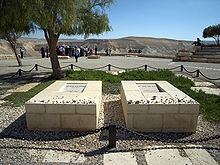 Graves of Paula and David Ben Gurion, Midreshet Ben-Gurion
Graves of Paula and David Ben Gurion, Midreshet Ben-Gurion
Ben-Gurion believed that the sparsely populated and barren Negev desert offered a great opportunity for the Jews to settle in Palestine with minimal obstruction of the Arab population. He set a personal example by choosing to settle in kibbutz Sde Boker at the centre of the Negev and established the National Water Carrier to bring water to the area. He saw the struggle to make the desert bloom as an area where the Jewish people could make a major contribution to humanity as a whole.[20]
Ben-Gurion died on 1 December 1973, and is buried alongside his wife Paula at a site in Midreshet Ben-Gurion in the Negev desert.
Awards
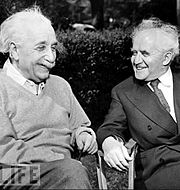 Albert Einstein and Ben Gurion
Albert Einstein and Ben Gurion
- In both 1951 and 1971, Ben-Gurion was awarded the Bialik Prize for Jewish thought.[21]
In 2005, he was voted the 2nd-greatest Israeli of all time, in a poll by the Israeli news website Ynet to determine whom the general public considered the 200 Greatest Israelis.[22]
Commemoration
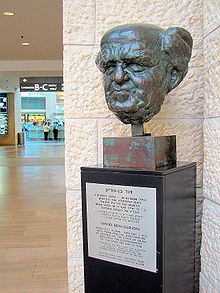 Sculpture of David Ben-Gurion at Ben Gurion International Airport, named in his honor
Sculpture of David Ben-Gurion at Ben Gurion International Airport, named in his honor
- Israel's largest airport, Ben-Gurion International Airport is named in his honor.
- One of Israel's major universities, Ben-Gurion University of the Negev, located in Beersheva, is named after him.
- Numerous streets, as well as schools, throughout Israel have been named after him.
- An Israeli modification of the British Centurion Tank was named after Ben-Gurion
- A desert research center, Midreshet Ben-Gurion, near his "hut" in Kibbutz Sde Boker has been named in his honor. Ben-Gurion's grave is in the research center.
- An English heritage blue plaque marks where Ben-Gurion lived in London at 75 Warrington Crescent, Maida Vale, Westminster, W9.[23]
- Is also a chapter in the Pacific Coast Region of The B'nai Brith Youth Organization in Pomona, California
- Part of a river-side promendae of the Seine is named after Ben-Gurion.[24]
See also
References
- ^ Brenner, Michael; Frisch, Shelley (April 2003). Zionism: A Brief History. Markus Wiener Publishers. pp. 184.
- ^ George Lavy, Germany and Israel: moral debt and national interest (1996) p. 45
- ^ Teveth, Shabtai (1985) Ben-Gurion and the Palestinian Arabs. From Peace to War. Oxford University Pres. ISBN 0 19 503562 3. Ezra - p.3,4; Paolei Zion - p.6; central committee - p.9; populations - p.10,21; Galilee p.12, 14-15.
- ^ Oswego.edu, Gila Hadar, "Space and Time in Salonika on the Eve of World War II and the Expulsion and Extermination of Salonika Jewry", Yalkut Moseshet 4, Winter 2006
- ^ Teveth, Shabtai (1985) Ben-Gurion and the Palestinian Arabs. From Peace to War. Oxford University Pres. ISBN 0 19 503562 3. Pages 66-70
- ^ Morris, Benny (3 October 2002). "Two years of the intifada – A new exodus for the Middle East?". The Guardian. http://www.guardian.co.uk/world/2002/oct/03/israel1. Retrieved 30 August 2010.
- ^ Ibid., pp. 34–35.
- ^ David Ben-Gurion, statement to the Assembly of Palestine Jewry, 2 October 1947
- ^ Nahum Goldmann, 'The Jewish Paradox' A Personal Memoir, translated by Steve Cox, 1978, ISBN 0-448-15166-9, p. 98, p. 100, p. 99
- ^ Simha Flapan, 'Zionism and the Palestinians', 1979, ISBN 0-85664-499-4, p. 142-144
- ^ S. Teveth, 1985, 'Ben-Gurion and the Palestinian Arabs', p. 199
- ^ S. Teveth, 1985, 'Ben-Gurion and the Palestinian Arabs', p. 200
- ^ Ben-Gurion's road to the State Ben-Gurion Archives (Hebrew)
- ^ Paul Johnson, A History of the Jews, p. 523.
- ^ The Status Quo Letter, in Hebrew
- ^ See eg Benny Morris, the Birth of the Palestinian Refugee Problem and The Birth of the Palestinian Refugee Problem Revisited
- ^ Mêrôn Benveniśtî, Sacred landscape: the buried history of the Holy Land since 1948, p. 120
- ^ Mêrôn Benveniśtî, Sacred landscape: the buried history of the Holy Land since 1948, p. 120
- ^ Randolph Churchill, Winston S.Churchill, The Six Day War,1967 p.199 citing 'The World at One' BBC radio, 12 July 1967
- ^ Importance of the Negev David Ben-Gurion, 17 January 1955 (Hebrew)
- ^ "List of Bialik Prize recipients 1933–2004" (in Hebrew). Tel Aviv Municipality website. http://www.tel-aviv.gov.il/Hebrew/_MultimediaServer/Documents/12516738.pdf.
- ^ גיא בניוביץ' (20 June 1995). "הישראלי מספר 1: יצחק רבין – תרבות ובידור". Ynet. http://www.ynet.co.il/articles/0,7340,L-3083171,00.html. Retrieved 10 July 2011.
- ^ David Ben-Gurion Blue Plaque in London Open plaques.org. Retrieved 12 October 2011
- ^ Byron, Joseph (May 15, 2010). "Paris Mayor inaugurates David Ben-Gurion esplanade along Seine river, rejects protests". European Jewish Press. http://www.ejpress.org/article/43542. Retrieved November 10, 2011.
Further reading
- Aronson, Shlomo (2011). David Ben-Gurion and the Jewish Renaissance. New York: Cambridge University Press. ISBN 9780521197489..
- Peres, Shimon (2011). Ben-Gurion, Schocken Pub., ISBN: 9780805242829.
External links
- David Ben-Gurion Knesset website
- Special Report David Ben-Gurion BBC News
- "David Ben-Gurion (1886–1973)" Jewish Agency for Israel
- Annotated bibliography for David Ben-Gurion from the Alsos Digital Library for Nuclear Issues
- March 2011 Ben-Gurion and Tewfik Toubi Finally Meet (28 October 1966)
Political offices Preceded by
(none)Chairman, Provisional State Council
14–16 May 1948Succeeded by
Chaim WeizmannNew office Prime Minister of Israel
1948–1953Succeeded by
Moshe SharettPreceded by
Moshe SharettPrime Minister of Israel
1955–1963Succeeded by
Levi EshkolParty political offices Preceded by
(none)Leader of Mapai
1948–1954Succeeded by
Moshe SharettPreceded by
Moshe SharettLeader of Mapai
1955–1963Succeeded by
Levi EshkolPreceded by
new partyLeader of Rafi
1965–1968Succeeded by
ceased to existPreceded by
new partyLeader of the National List
1968–1970Succeeded by
Yigael HurvitzDavid Ben-Gurion Prime Ministers of Israel 
 Ben-Gurion (1948–53) · Sharett (1953–55) · Ben-Gurion (1955–63) · Eshkol (1963–69) · Allon (acting) · Meir (1969–74) · Rabin (1974–77) · Begin (1977–83) · Shamir (1983–84) · Peres (1984–86) · Shamir (1986–92) · Rabin (1992–95) · Peres (1995–96) · Netanyahu (1996–99) · Barak (1999–2001) · Sharon (2001–06) · Olmert (2006–09) · Netanyahu (2009–present)
Ben-Gurion (1948–53) · Sharett (1953–55) · Ben-Gurion (1955–63) · Eshkol (1963–69) · Allon (acting) · Meir (1969–74) · Rabin (1974–77) · Begin (1977–83) · Shamir (1983–84) · Peres (1984–86) · Shamir (1986–92) · Rabin (1992–95) · Peres (1995–96) · Netanyahu (1996–99) · Barak (1999–2001) · Sharon (2001–06) · Olmert (2006–09) · Netanyahu (2009–present)
Defense Ministers of Israel  Ben-Gurion (1948–54) · Lavon (1954–55) · Ben-Gurion (1955–63) · Eshkol (1963–67) · Dayan (1967–74) · Peres (1974–77) · Weizman (1977–80) · Begin (1980–81) · Sharon (1981–83) · Arens (1983–84) · Rabin (1984–90) · Shamir (1990) · Arens (1990–92) · Rabin (1992–95) · Peres (1995–96) · Mordechai (1996–99) · Arens (1999) · Barak (1999–2001) · Ben-Eliezer (2001–02) · Mofaz (2002–06) · Peretz (2006–07) · Barak (2007–)
Ben-Gurion (1948–54) · Lavon (1954–55) · Ben-Gurion (1955–63) · Eshkol (1963–67) · Dayan (1967–74) · Peres (1974–77) · Weizman (1977–80) · Begin (1980–81) · Sharon (1981–83) · Arens (1983–84) · Rabin (1984–90) · Shamir (1990) · Arens (1990–92) · Rabin (1992–95) · Peres (1995–96) · Mordechai (1996–99) · Arens (1999) · Barak (1999–2001) · Ben-Eliezer (2001–02) · Mofaz (2002–06) · Peretz (2006–07) · Barak (2007–)
Transportation Ministers of Israel  Remez (1948-50) · Yosef (1950-51) · Pinkas (1951-52) · Ben-Gurion (1952) · Serlin (1952-53) · Sapir (1953-55) · Aran (1955) · Carmel (1955-59) · Ben-Aharon (1959-62) · Bar-Yehuda (1962-65) · Carmel (1965-69) · Weizman (1969-70) · Peres (1970-74) · Yariv (1974) · Yaacobi (1974-77) · Begin (1977) · Amit (1977-78) · Landau (1979-81) · Corfu (1981-88) · Katsav (1988-92) · Kessar (1992-96) · Levy (1996-98) · Yahalom (1998-99) · Mordechai (1999-2000) · Lipkin-Shahak (2000-01) · Sneh (2001-02) · Sharon (2002) · Hanegbi (2002-03) · Lieberman (2003-04) · Sheetrit (2004-06) · Mofaz (2006-09) · Katz (2009-)
Remez (1948-50) · Yosef (1950-51) · Pinkas (1951-52) · Ben-Gurion (1952) · Serlin (1952-53) · Sapir (1953-55) · Aran (1955) · Carmel (1955-59) · Ben-Aharon (1959-62) · Bar-Yehuda (1962-65) · Carmel (1965-69) · Weizman (1969-70) · Peres (1970-74) · Yariv (1974) · Yaacobi (1974-77) · Begin (1977) · Amit (1977-78) · Landau (1979-81) · Corfu (1981-88) · Katsav (1988-92) · Kessar (1992-96) · Levy (1996-98) · Yahalom (1998-99) · Mordechai (1999-2000) · Lipkin-Shahak (2000-01) · Sneh (2001-02) · Sharon (2002) · Hanegbi (2002-03) · Lieberman (2003-04) · Sheetrit (2004-06) · Mofaz (2006-09) · Katz (2009-)
Justice Ministers of Israel  Rosen (1948-51) · Yosef (1951-52) · Cohn (1952) · Rosen (1952-56) · Ben-Gurion (1956-58) · Rosen (1958-61) · Yosef (1961-66) · Shapira (1966-72) · Meir (1972) · Shapira (1972-73) · Meir (1973-74) · Zadok (1974-77) · Begin (1977) · Tamir (1977-80) · Nissim (1980-86) · Moda'i (1986) · Sharir (1986-88) · Meridor (1988-92) · Libai (1992-96) · Ne'eman (1996) · Netanyahu (1996) · Hanegbi (1996-99) · Beilin (1999-2001) · Sheetrit (2001-2003) · Lapid (2003-04) · Livni (2004-06)* · Ramon (2006) · Sheetrit (2006)* · Olmert (2006)* · Livni (2006-07) · Friedmann (2007-09) · Ne'eman (2009-)
Rosen (1948-51) · Yosef (1951-52) · Cohn (1952) · Rosen (1952-56) · Ben-Gurion (1956-58) · Rosen (1958-61) · Yosef (1961-66) · Shapira (1966-72) · Meir (1972) · Shapira (1972-73) · Meir (1973-74) · Zadok (1974-77) · Begin (1977) · Tamir (1977-80) · Nissim (1980-86) · Moda'i (1986) · Sharir (1986-88) · Meridor (1988-92) · Libai (1992-96) · Ne'eman (1996) · Netanyahu (1996) · Hanegbi (1996-99) · Beilin (1999-2001) · Sheetrit (2001-2003) · Lapid (2003-04) · Livni (2004-06)* · Ramon (2006) · Sheetrit (2006)* · Olmert (2006)* · Livni (2006-07) · Friedmann (2007-09) · Ne'eman (2009-)
- entire or partial tenure as Substitute Justice Minister, until a replacement was found
Education Ministers of Israel  Shazar (1949–50) · Remez (1950–51) · Ben-Gurion (1951) · Dinur (1951–55) · Aran (1955–60) · Eban (1960–63) · Aran (1963–69) · Allon (1969–74) · Yadlin (1974–77) · Hammer (1977–84) · Navon (1984–90) · Hammer (1990–92) · Aloni (1992–93) · Rabin (1993) · Rubinstein (1993–96) · Hammer (1996–98) · Levy (1998–99) · Sarid (1999–2000) · Barak (2000–01) · Livnat (2001–06) · Sheetrit (2006) · Tamir (2006–09) · Sa'ar (2009–)
Shazar (1949–50) · Remez (1950–51) · Ben-Gurion (1951) · Dinur (1951–55) · Aran (1955–60) · Eban (1960–63) · Aran (1963–69) · Allon (1969–74) · Yadlin (1974–77) · Hammer (1977–84) · Navon (1984–90) · Hammer (1990–92) · Aloni (1992–93) · Rabin (1993) · Rubinstein (1993–96) · Hammer (1996–98) · Levy (1998–99) · Sarid (1999–2000) · Barak (2000–01) · Livnat (2001–06) · Sheetrit (2006) · Tamir (2006–09) · Sa'ar (2009–) Categories:
Categories:- Government ministers of Israel
- 1886 births
- 1973 deaths
- People from Płońsk County
- Jewish socialists
- Polish Jews
- Polish emigrants to Israel
- Histadrut General secretaries
- Prime Ministers of Israel
- Israeli party leaders
- Members of the Assembly of Representatives (Mandate Palestine)
- Signatories of the Israeli Declaration of Independence
- Cold War leaders
- Members of the Knesset
- Ashkenazi Jews
- Israeli Jews
- Jews in Ottoman and British Palestine
- Istanbul University alumni
- Burials in Israel
- Bialik Prize recipients
- Mapai politicians
- Rafi (political party) politicians
- National List politicians
Wikimedia Foundation. 2010.

